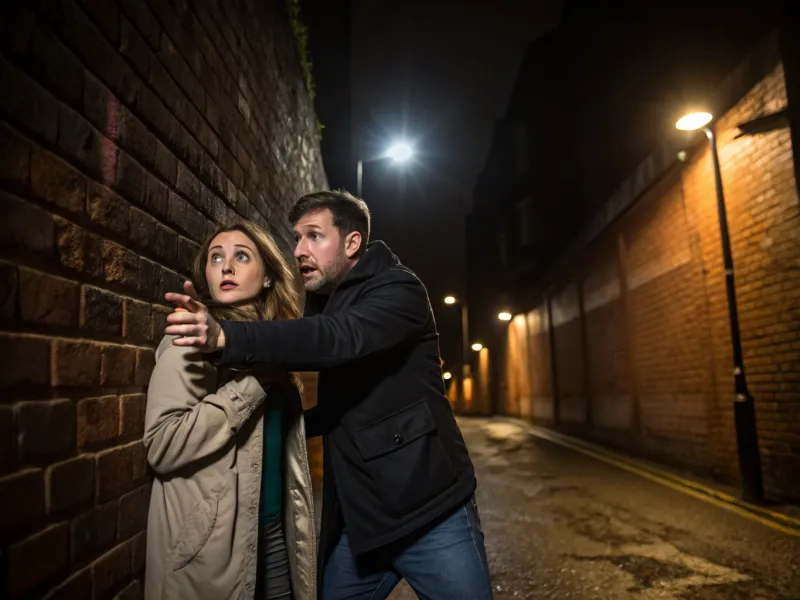30 Red Flags That Could Have Prevented Toxic Relationships If People Hadn’t Ignored Them
Grab your favorite mug and settle in, because today, we’re diving into some real talk about those sneaky little red flags we often overlook in relationships. You know, the ones that later make us go, “Why didn’t I see that coming?” Trust me, we’ve all been there, sipping our lattes, and wishing we’d paid attention to those little signs. So, let’s get cozy and chat about 30 red flags that could save us from future heartache.
1. Constant Criticism

Ever sat there, coffee in hand, wondering why every little thing you do is somehow wrong? Welcome to the world of constant criticism—a subtle yet powerful red flag. When your partner makes you feel like a walking mistake, it’s time to listen up. This kind of behavior chips away at self-esteem, creating an unbalanced relationship where one person holds all the power.
Think about it, if someone loves you, why would they want to constantly put you down? This isn’t about helping you grow; it’s about control. When criticism becomes a daily ritual, it’s more than just a bad habit. It’s destructive.
The key is recognizing the pattern early. Once you spot it, have an open conversation. If they’re unwilling to change, it might be time to reconsider why you’re sticking around. Life’s too short for coffee that’s too bitter and love that’s too sharp.
2. Excessive Jealousy

Jealousy can be cute in small doses, like when someone gives you a flirty glance and your partner playfully pouts. But when it turns into an all-consuming fire, it’s time to grab the extinguisher. Excessive jealousy is a major red flag that often leads to possessiveness and paranoia.
Imagine someone constantly checking your phone or questioning your every move. Exhausting, right? Trust should be the foundation of any relationship, and without it, you’re building a house of cards.
A little reassurance goes a long way, but if your partner’s jealousy feels more like a part-time job, it’s worth addressing. Talk it out, set boundaries, and if they can’t respect those, it might be time to pack up your heart and find someone who trusts you without condition.
3. Lack of Communication

Picture this: You’re sitting across from each other, but the silence is deafening. No, this isn’t a scene from a suspense movie—it’s a relationship suffering from lack of communication. When words become rare and meaningful conversations are non-existent, you’ve got a red flag waving in your face.
Communication is the lifeline of any relationship. Without it, misunderstandings brew, and assumptions take over, leading to unnecessary drama.
To avoid this downward spiral, prioritize open dialogue. Share your thoughts, listen actively, and encourage your partner to do the same. If you find you’re talking to a wall, it might be time to reassess the connection. Remember, in matters of the heart, silence isn’t golden—it’s rust.
4. Disrespect for Boundaries

Boundaries are like the invisible lines that keep a relationship healthy. Without them, things get messy—fast. If your partner doesn’t respect your boundaries, whether it’s personal space or emotional limits, this is a serious red flag.
Think of it like this: You wouldn’t let someone barge into your home uninvited, so why let them trample over your boundaries? Respect is key, and without it, resentment grows.
If you notice your partner constantly pushing limits, have a candid talk about your needs. If they shrug it off or dismiss your concerns, it might be time to evaluate if this is the relationship you want. Boundaries aren’t just suggestions; they’re essential for a happy, balanced connection.
5. Avoiding Responsibility

Let’s face it, no one’s perfect, but there’s a big difference between making mistakes and refusing to take responsibility. When your partner habitually avoids accountability and plays the blame game, that’s a glaring red flag.
Imagine every time something goes wrong, they point the finger at you, never owning up to their part. It’s exhausting and unfair, leaving you to shoulder burdens that aren’t yours.
Healthy relationships thrive on mutual respect and responsibility. Next time blame is being tossed around like confetti, call it out. If they can’t face up to their actions, maybe it’s time to find someone who can. After all, love should lift you up, not pin you down with guilt.
6. Gaslighting

Ever felt like you’re losing your mind because your partner insists their version of events is the only truth? Welcome to gaslighting—a sinister form of manipulation. This red flag is all about making you doubt your reality.
Gaslighting can leave you questioning everything, eroding your confidence and making you feel dependent on their approval. It’s a psychological trap, and once you’re in it, climbing out can be tough.
Recognizing gaslighting early is crucial. Trust your instincts and seek support from friends or professionals if needed. Remember, love should be empowering, not a psychological chess game. Stand firm in your truth, and don’t let anyone rewrite your story.
7. Controlling Behavior

Control in a relationship can be subtle or overt, but no matter the form, it’s a major red flag. Whether it’s dictating who you can see, what you wear, or how you spend your time, controlling behavior is about power, not love.
Imagine feeling like you’re constantly walking on eggshells, afraid to set off your partner’s controlling tendencies. This isn’t a partnership; it’s a dictatorship.
Healthy relationships are built on freedom and mutual respect. If you notice signs of control, address them head-on. Set clear boundaries, and if those aren’t respected, it’s time to reconsider. Your life is yours to live, not to have dictated by someone else’s whims.
8. Persistent Lying

Everyone tells a white lie now and then, but when lying becomes a habit, it’s a red flag that shouldn’t be ignored. Persistent lying destroys trust and plants seeds of doubt.
Think of trust as the cornerstone of any relationship. Once that’s eroded, everything else crumbles. Lies, no matter how small, can grow into a tangled web that’s hard to escape.
Address dishonesty as soon as you spot it. Talk openly about how lies affect you and set clear expectations for honesty. If your partner continues to spin tales, consider if this is the kind of relationship you want. Life’s too short to keep digging for the truth.
9. Emotional Unavailability

Ever feel like you’re talking to a brick wall when you try to have a heartfelt conversation with your partner? Emotional unavailability is a red flag that signals deeper issues.
A relationship without emotional connection is like a car with no fuel—it’s not going anywhere. When one partner consistently fails to engage emotionally, it leaves the other feeling isolated and unsupported.
If you notice this pattern, it’s time to communicate your needs clearly. Encourage vulnerability, but if your partner remains emotionally closed off, it might be time to reassess. Love should be a shared journey, not a solo expedition.
10. Isolation from Friends and Family

Does your partner make you feel like you’re all you need is them, cutting you off from friends and family? This is a classic red flag that signals control.
Building a life together shouldn’t mean dismantling your existing support system. Isolation can lead to dependency, which isn’t healthy for any relationship.
If your partner discourages you from maintaining connections, have an honest talk about the importance of your social circles. If they’re not supportive, it might be time to evaluate if this relationship allows you to flourish. Remember, love should expand your world, not shrink it.
11. Financial Control

Money can be a sticky subject, but when one partner controls all the finances, it’s a red flag waving high. Financial control is more about power than budgeting.
Picture having to ask permission to spend your own money or being kept in the dark about financial matters. It’s not just frustrating; it’s controlling.
Talk openly about finances early on, setting clear boundaries and expectations. If your partner resists transparency, it’s time to question why. A healthy relationship is a partnership, not a financial dictatorship.
12. Excessive Flattery

Who doesn’t love a genuine compliment? But when flattery feels excessive and insincere, it’s a red flag that might indicate manipulation.
Imagine being bombarded with praise to the point where it feels more like a tactic than a heartfelt gesture. Excessive flattery can be a way to distract or obscure negative behavior.
Trust your gut. If compliments feel hollow, discuss your feelings with your partner. Authenticity matters more than quantity. If they brush off your concerns, it might be worth considering if this relationship truly values you for who you are.
13. Too Much Too Soon

We’ve all heard of whirlwind romances, but when things move too fast, it’s a red flag that shouldn’t be ignored. Whether it’s declarations of love on the first date or planning a future together prematurely, it’s worth pumping the brakes.
Rushing can mask deeper issues or incompatibilities that time would reveal. It’s important to build trust and understanding over time, not in a whirlwind.
Communicate your need for a comfortable pace and ensure both partners are on the same page. If they’re pushing for too much too soon, consider if they’re truly invested in knowing you or just the idea of being in a relationship.
14. Playing the Victim

Ever notice how some people always seem to be the victim, no matter the situation? It’s a classic red flag that indicates emotional manipulation.
Playing the victim can be a way to avoid responsibility and elicit sympathy, creating an imbalance in the relationship. It can leave you feeling guilty for things that aren’t your fault.
Address this behavior by discussing your observations. Encourage accountability and self-reflection. If they refuse to change, it might be time to reevaluate. A healthy relationship shouldn’t feel like a guilt trip or a one-sided story.
15. Inconsistent Behavior

Does your partner swing from loving to distant at the drop of a hat? Inconsistent behavior is a red flag that can lead to emotional whiplash.
Unpredictability creates an unstable environment, where you’re left guessing what mood they’ll be in next. It’s not just confusing; it’s exhausting.
Talk about how their inconsistency affects you. Seek stability and reliability in your relationship. If they can’t offer that, maybe it’s time to find someone who can. Consistency is key to a thriving partnership.
16. Secretive Behavior

Secrets can be thrilling in mystery novels, but in relationships, they spell trouble. Secretive behavior is a red flag that often points to deeper issues.
Imagine living with constant suspicion because your partner hides their phone or is vague about their whereabouts. Trust erodes quickly in the face of secrecy.
Discuss the importance of transparency and trust. If they’re unwilling to be open, consider if this is the relationship you want. Love should be about sharing lives, not living in the shadows.
17. Frequent Arguments

Arguments are normal, but when they become a regular occurrence, it’s a red flag that shouldn’t be ignored. Constant fighting indicates underlying issues that need addressing.
Frequent arguments can create a toxic atmosphere, where tension overshadows love and understanding. It’s not just tiring, it’s unsustainable.
Focus on conflict resolution and open communication. If arguments persist, it might be time to evaluate the relationship’s foundation. Love should be a peaceful partnership, not a battleground.
18. Lack of Support

Feeling unsupported by your partner can be incredibly isolating. A lack of support is a red flag that signals an imbalance in the relationship.
Imagine sharing your dreams and achievements only to be met with indifference or dismissal. It’s disheartening and can chip away at your confidence.
Communicate your need for encouragement and support. If they’re unwilling to be your cheerleader, reconsider if this is the partnership you deserve. Love should uplift and celebrate, not undermine.
19. Emotional Blackmail

Emotional blackmail is a sneaky red flag that can turn a relationship toxic. It involves using guilt and manipulation to control behavior.
Imagine feeling pressured to do things out of fear of emotional reprisal. It’s manipulative and erodes trust.
Address this behavior directly and set clear emotional boundaries. If they continue to use emotions as a weapon, it might be time to reconsider your relationship. Love should be based on mutual respect, not fear.
20. Ignoring Your Needs

When your needs are constantly overlooked, it’s a red flag indicating a lack of empathy and respect. Ignoring your needs creates an unbalanced relationship where one partner’s desires overshadow the other’s.
Imagine voicing your needs only to see them brushed aside. It’s frustrating and can lead to resentment.
Communicate your needs clearly and assertively. If your partner continues to dismiss them, it might be time to evaluate if this relationship allows you to truly be yourself. Love should be a two-way street, not a one-way ticket to disregard.
21. Past Relationship Baggage

We all have pasts, but when old flames haunt your current relationship, it’s a red flag. Past relationship baggage can create unnecessary tension.
Imagine constantly hearing about their ex, feeling like a ghost from the past is competing for space in your present. It’s uncomfortable and unfair.
Discuss how these stories affect you and focus on building your own memories together. If they can’t let go of the past, consider if this relationship is right for you. Love should be about the present and future, not the past.
22. Unequal Effort

Relationships require effort from both sides. When one partner consistently does all the work, it’s a red flag that signals imbalance.
Imagine planning dates, making compromises, and constantly giving, only to receive little in return. It’s draining and unsustainable.
Talk about the importance of equal effort and mutual contribution. If your partner is unwilling to step up, reconsider if this is the partnership you desire. Love should be a shared journey, not a solo endeavor.
23. Threatening Behavior

Threatening behavior is a glaring red flag that should never be ignored. It indicates a lack of respect and safety in the relationship.
Imagine feeling scared or anxious because your partner uses intimidation as a tool. It’s not just unhealthy; it’s dangerous.
Address this behavior immediately and seek support if needed. If they refuse to change, it might be time to prioritize your safety and well-being. Love should never feel threatening or unsafe.
24. Neglecting Personal Growth

Personal growth is essential for a fulfilling relationship. When one partner neglects this, it’s a red flag that can stifle the relationship’s potential.
Imagine feeling stagnant because your partner isn’t interested in growth or development. It’s limiting and can lead to resentment.
Encourage personal and mutual growth. If they resist or dismiss its importance, consider if this is the relationship you want. Love should inspire both partners to become better versions of themselves.
25. Making You Feel Inferior

No one should make you feel less than amazing. Making you feel inferior is a red flag that signals deeper issues of self-esteem and respect.
Imagine being constantly belittled or patronized. It’s demoralizing and can erode your confidence.
Address this behavior head-on, and demand respectful communication. If they can’t appreciate you for who you are, it might be time to seek a relationship that does. Love should lift you up, not put you down.
26. Refusal to Compromise

Compromise is the backbone of any successful relationship. A refusal to meet halfway is a red flag that signals stubbornness and inflexibility.
Imagine feeling frustrated because your partner always insists on having things their way. It’s not only selfish; it stifles growth and harmony.
Discuss the importance of compromise and finding balance. If they’re unwilling to budge, consider if this relationship allows room for mutual happiness. Love should be about give and take, not take and take.
27. Inconsistent Affection

Affection should be consistent, not conditional. Inconsistent affection is a red flag that can create confusion and insecurity.
Imagine being showered with love one moment and forgotten the next. It’s unsettling and can lead to emotional instability.
Communicate your need for consistent affection. If your partner can’t offer that, reconsider if this relationship provides the security you need. Love should be a steady embrace, not a wavering gesture.
28. Unresolved Past Trauma

Past trauma can affect present relationships if left unresolved. It’s a red flag that can create barriers and misunderstandings.
Imagine facing emotional walls because your partner hasn’t dealt with their past. It’s challenging and can impede connection.
Encourage seeking help and offer support. If they’re unwilling to confront their past, consider if this relationship allows for a healthy future. Love should heal, not hinder.
29. Overdependence

While support is crucial, overdependence is a red flag that can create imbalance. It’s about needing rather than wanting.
Imagine feeling smothered because your partner relies on you for everything. It’s not just overwhelming; it’s unsustainable.
Encourage independence and personal space. If they can’t stand on their own, consider if this relationship supports individual growth. Love should complement, not consume.
30. Dismissive of Your Interests

Your interests are a part of who you are, and dismissing them is a red flag. It shows a lack of respect and understanding.
Imagine sharing your passions only to see them belittled or ignored. It’s disheartening and can create distance.
Talk about the importance of mutual respect and interest in each other’s lives. If they’re dismissive, reconsider if this relationship values you wholly. Love should celebrate your uniqueness, not dismiss it.







